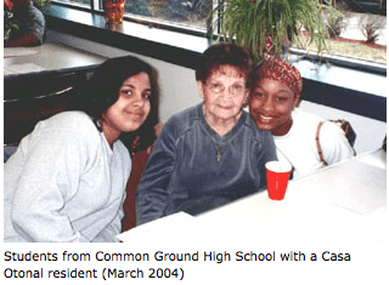SEE
|
Service-learning has been demonstrated to provide a number of benefits to students, schools and communities. The following themes have consistently emerged as positive results for well-implemented service-learning projects. The YES program supports implementation research-based practices. Footnotes for each theme are cited below.
Promotes learning—1,6,9,11,13,14 School engagement, attendance, work orientation, academic performance, graduation rate Supports development of personal skills—1,7,8,10,14 Ability to work in groups, student interpersonal relationships, social development, problem solving, respect for other cultures |
Advances useful civic skills—1,2,4,7,9,12,13,14
Inclination to future service, recognition of ability to contribute, senses of community responsibility, group communication skills, civic engagement
Encourages positive character development—1,2,3,7,10,14
Increases prosocial behavior, reduces conflicts and violence, increases confidence, increase empathy and respect for others, increases moral reasoning
Improves classroom/school climate—13,14
Reduces discipline referrals, increases student engagement, reduces conflicts
Footnotes:
Inclination to future service, recognition of ability to contribute, senses of community responsibility, group communication skills, civic engagement
Encourages positive character development—1,2,3,7,10,14
Increases prosocial behavior, reduces conflicts and violence, increases confidence, increase empathy and respect for others, increases moral reasoning
Improves classroom/school climate—13,14
Reduces discipline referrals, increases student engagement, reduces conflicts
Footnotes:
- Melchior, A., & Orr, L. Evaluation of National and Community Service Programs, Final Report, National Evaluation of Serve-America, Prepared for Corporation for National Service, 1995.
- Corporation for National Service, National Evaluation of Learn and Serve America School and Community-Based Programs, Interim Report, April, 1997.
- Clayton, C. J., Ballif-Spanvill, B., & Hunsaker, M.D. (2001). Preventing violence and teaching peace: A review of promising and effective antiviolence, conflict-resolution, and peace programs for elementary school children. Applied & Preventive Psychology, 10, 1-35.
- Leming, John S., Character Evaluation Associates, Final Report, The Institute for Global Ethics, 1999.
- Points of Light Foundation, Service-Learning Research, Generator, Winter, 1997
- Kurth-Schai, R. The Roles of Youth in Society: A Reconceptualization. Educational Forum, Winter, 1988.
- Skinner, R. & Chapman, C. Service-Learning and Community Service in K-12 Public Schools. National Center for Education Statistics, 1999.
- Snow-Renner, R., Vermeer, S., Cumbo, K., Pickeral, T. & Miller, J. (2004). Creating high-performing schools through service-learning: A service-learning trail guide. Denver, Co: Colorado Department of Education.
- Billig, S. H. (2005). Use research knowledge to advance district-wide service-learning. District Lessons, (3). National Service-Learning Partnership.
- RMC Research Corporation. (2004). The impact of service-learning on student achievement: A statewide study of Michigan learn and serve grantees 2004 research brief. Denver, Co: Author.
- Billig, S., Root, S., & Jesse, D. (2005). The impact of participation in service-learning on high school students’ civic engagement. Circle Working Paper 33. College Park, MD: University of Maryland’s School of Public Affairs.
- National Youth Leadership Council. (2004). Growing to greatness: 2004 state of service-learning report. St. Paul, MN: Author.
- Billig, S. H. (2000). The impacts of service-learning on youth, schools and communities: Research on K-12 school-based service-learning, 1990-1999. Learning in Deed Research Summary. New York, NY: National Service-Learning Partnership.
- Kezar, A. (2002). Assessing community service learning: Are we identifying the right outcomes? About Campus, May-June.
Ethics in action creates character

